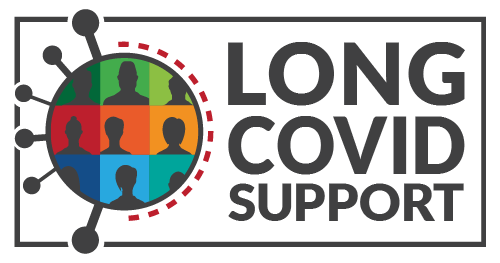Date of Webinar: 27 June 2025
Organised by: Long Covid Support and University of Oxford
Presenters: Dr. Maaret Jokela-Pansini, Professor Beth Greenhough, Oonagh Cousins
Watch the full webinar recording here: https://www.youtube.com/watch?v=oduHaNiiXmI&t=1s
The launch event introduced the new Body Mapping Toolkit, developed through a research project led by the University of Oxford in collaboration with Long Covid Support and people living with Long Covid. The toolkit is designed to support communication, peer connection, and personal reflection. It provides a structured introduction to body mapping and can be used either individually or in peer-support workshops.
What is Body Mapping?
Body mapping is a visual, arts-based method that is particularly well-adapted for working with people who may struggle to put their experiences into words. People with Long Covid often struggle with communication due to cognitive dysfunction, fatigue, and simply not having the right language to describe how they feel. Many also experience stigma, which can discourage open expression.
As one participant shared in a workshop:
"People rely on words with the closest related meaning, which often end up diminishing the severity of the actual symptom - for example, ‘fatigue’. Fatigue infers a meaning similar to ‘tiredness’, but the actual experience is often drastically worse and feels more like a ‘deep sickness’."
Project Background
The project aimed to explore how body mapping could:
- Better capture the range and depth of Long Covid experiences.
- Support peer connection and shared understanding.
- Help people communicate their illness to others.
It also aimed to contribute to broader research conversations in geography and health by centring participatory, patient-led methods and recognising the embodied nature of chronic illness.
Toolkit Development Process
- Three online workshops
- 13 participants
- Follow-up sessions and a post-workshop survey
Workshops included mindfulness, creative exercises, the body mapping activity, opportunities to share and present the body maps, and regular breaks to support pacing.
Reflections
1. Supporting People with Severe Long Covid
Online body mapping workshops can help address a gap in support for people with more severe Long Covid. Those at the more severe end of the spectrum are often housebound or bedbound and can become deeply isolated. Online workshops offer the flexibility to join from anywhere, including from bed, and allow people to participate in ways that suit their needs. Participants could also leave easily by simply turning off Zoom, which can be more manageable than leaving an in-person setting.
2. A Powerful Tool That Must Be Handled with Care
Body mapping can be an emotionally intense experience. For many, Long Covid has been a difficult and often traumatic experience. The workshops were, for some, the first opportunity to discuss what they’d been through with others who understood. This brought up a range of emotions. While the experience was sometimes challenging, many described it as positive and healing overall.
“It seriously knocked me about… but I think it was really important for me to be able to move forward… I was stuck, and I think it helped. It was extremely difficult, but really worth it.”
Participants emphasised the importance of ongoing support, not just during the session but in the days that followed. Follow-up sessions were particularly valued as a space to reflect and reconnect. It's important to strike a balance between offering support and respecting autonomy. Everyone’s experience of Long Covid is different, so providing flexible options helps ensure participants feel heard, respected, and safe.
3. Pacing and Energy Management
Pacing involves managing daily activities by taking regular breaks and allowing rest, with the frequency and duration tailored to the severity of symptoms. People with Long Covid often use the word ‘spoons’ to describe how many units of energy they have in any given day, before their symptoms start to worsen.
The workshop was structured to include regular breaks and quiet moments, encouraging people to rest when needed. Based on feedback, the toolkit now suggests running workshops over two or three shorter sessions, spread across several weeks, to better accommodate individual energy levels.
4. Creating Space for Self-Expression
Body mapping provides a unique opportunity for people to visualise their experience on their own terms. Many people with Long Covid have faced dismissal or misunderstanding, including by healthcare professionals or employers. This can be distressing and disempowering. Even within research, traditional methods can unintentionally mirror these dynamics by controlling the conversation or not fully recognising the emotional weight of illness. Body mapping gives participants a different kind of space, one where they can tell their story on their own terms, without interruption or external interpretation.
Participant Feedback
Feedback from the workshops was overwhelmingly positive, with an average rating of 4.45 out of 5. Many participants described the process as emotional but cathartic, often marking the first time they’d shared their story visually. Common reflections included: feeling seen and validated, realising they are not alone, gaining new perspectives on their own experience.
Toolkit Launch
The Body Mapping Toolkit is now publicly available and can be used independently or in peer-led groups.
Access the toolkit here: https://visualisinglongcovid.org/toolkit/
Long Covid Support hopes to run workshops when resources and capacity allow.
Acknowledgements
This project was supported by the University of Oxford’s Social Sciences Division and funded by the Higher Education Innovation Fund (HEIF).
We are deeply grateful to the individuals living with Long Covid who generously contributed their time, creativity, and stories to shape this work.
Contact
For questions or feedback, please get in touch:
Oonagh Cousins - oonaghcousins(at)longcovid.org
Dr. Maaret Jokela-Pansini - maaret.jokela-pansini(at)ouce.ox.ac.uk
Professor Beth Greenhough - beth.greenhough(at)ouce.ox.ac.uk



















